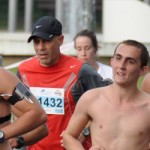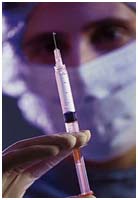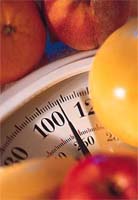If you have been confined to bed recently with a severe infection (glandular fever, severe cold, flu, or bronchitis) your doctor will most probably have given you a course of antibiotics and the immediate symptoms will have disappeared.
 Unfortunately, antibiotics can be likened to using a sledge-hammer to kill a fly on the wall. The fly will be killed all right if the blow is well aimed; however, the wall will be damaged. Antibiotics are known to kill off half of the body’s reserves of vitamins and minerals. The result is that you will feel “washed out” for a considerable period, and in some cases, the infection returns, albeit on a reduced scale. This can play havoc with your training.
Unfortunately, antibiotics can be likened to using a sledge-hammer to kill a fly on the wall. The fly will be killed all right if the blow is well aimed; however, the wall will be damaged. Antibiotics are known to kill off half of the body’s reserves of vitamins and minerals. The result is that you will feel “washed out” for a considerable period, and in some cases, the infection returns, albeit on a reduced scale. This can play havoc with your training.
Fitness is gained in 12-week blocks of a minimum of every other day training lasting not less than 35 minutes’ duration. An athlete, who constantly has to rest a week or two during a 12-week block, will not make much improvement in fitness. The most important fact in improved condition is not to have interruptions in the rhythmical training cycle. It is better to train three times a week for 24 weeks, than to train five times a week with a week off every month due to illness for the same period. To nip serious breakdowns in health – follow this procedure after a severe infection has been “cured”.
1. Take your pulse immediately on awakening. Write it down, e.g. 15 beats in 15 sec x 4 = 60bpm.
2. As soon as you get out of bed and put on your dressing gown – take your pulse again for 15 seconds. This time, it might be 18 beats per 15 sec, which will be 72bpm.Write down the difference: in this example it is 12 beats.
3. After a week of doing this, you will get a mean average difference. When the difference is up – i.e. more than the average – don’t train that day. You are showing signs of stress and slight infection. You can, however, train more severely when the difference is down.
4. If the previous infection involved the trachea (windpipe), as would be the case with coughs and bronchitis, the vitamin responsible for its health (the membranes) should be increased. The RDA for vitamin A is 800 microgram’s; this should be doubled for one month only.
5. Infections severely deplete vitamin C stores in the eyes and adrenal glands. The latter very important to a runner: it is where the hormone ACTH is secreted for all physical activity. Also, what vitamin C you consume is devoured quickly to help manufacture new white cells – lymphocytes, which help fight infections. Raise your vitamin C intake to 1,000mg daily for a month. This releases hormones which (a) make you feel good; (b) lower blood pressure and (c) push back the pain barrier.
6. The mineral zinc has long been associated with immunity to infection. Runners are known to be liable to a deficiency because a lot is lost via sweat. Raise your zinc intake to 30mg daily. Be careful to take this supplement after a meal, on an empty stomach it can make you sick very quickly.
7. Eat moderate-sized meals every 4 hours which have: fruit, vegetables, lean meet, fish, skimmed milk and whole grain cereals. Avoid too many take-aways: junk food makes junk bodies.
Article by Time-to-Run Cape Town resident coach Dave Spence
View other articles of interest under the Sports Doctor section:
- When a bug strikes
- Exercise-induced anaphylaxis: ‘Why do I itch so badly?
- A run a day keeps you out of the doctor’s office
- Anemia and iron deficiency
- Runner’s Trots
- Bloody urine: Why?
- Human body – Heart and Lungs
- Upper Respiratory Infections
- Exercise and the Immune system
With more topics to be added.
Other Topics of interest :


























[…] When a bug strikes is a post from: Sports Doctor section […]